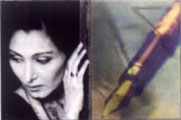Issue
September 15 - 30

A lesson in the power of Nature.
It was the first time I was
looking at the Ganga up close. It ran swift and awesome, the sides lapping
against the banks, in foaming little eddies and whirlpools, whose might I would
not want to test against mine. The river was a dark muddy brown.
I sat on
the cement parapet, watching, fascinated at its swift flowing, oblivious to the
throng of people that was slowly amassing all around. It was a grey, rainy
evening in Rishikesh. I was waiting for the
aarti
to the Ganga to begin.
As I sat, gingerly placing myself on
the very edge of a
dhurrie
that had
seen cleaner, brighter days, and trying to ignore the oil and milk smells of the
people who were collecting there, a batch of young students settled itself like
a flock of birds, on the
dhurrie
, next
to me.
They were all dressed in saffron
kurtas
and immaculately-tied
dhotis
, and wore sandalwood paste marks
on their foreheads. They fluttered and fussed and then settled down, and soon,
even as the sun peeped out through a mass of cloud and the rain held its breath,
they began to recite the
Hanuman
Chalisa
in high-pitched sing-song voices.
I watched them closely,
and I could not but notice the different personalities that stood out in the
mass. There were the devout, who with eyes tightly shut, recited the prayer by
rote; there was the young boy who sat listening and piped in now and then,
whenever the chorus came up.
The child is indeed father of the man, I
thought to myself, and in each the seed of what he would become lay waiting to
blossom. For now, they all formed one faceless voice.
When the
arati
began, all mayhem broke loose.
The orderly crowd suddenly got to its feet and surged forward. And to my
amazement, in a perfect demonstration of the demystification of religion, the
pandas
, who in other eras, would not
have let anyone approach them or touch their holy vessels, passed the
arati
lamps from one grasping hand to
another, up and down the river front, waiting patiently while each devotee
whirled the lamps and took the heat of the sacred flame.
The river, not
stopping to watch, flowed swiftly on. I sat awhile, waiting for the crowds to
disperse. They flowed away too, in bursts and groups. I watched the river some
more, still caught in its mighty power. I watched an old man, standing
dangerously close to the edge, fill a plastic bottle painstakingly with water
scooped from his palm. Then, my eyes widened in horror as he scooped another
palmful, and sipped deeply of it.
He's drinking the water, I thought; this
dirty, muddy water that bears carcasses, and into which the entire town
thoughtlessly empties its filth... He holds it sacred enough to drink. I
marvelled at his faith. And envied it a little.
For years as a child, I
had grown up holding the waters of the Ganga sacred. Even today, in my
mother’s
puja
place, there is a
sealed copper vessel that holds the river water — something she picked up
when I was a child or perhaps earlier. I have often wondered if the river of
today would recognise the water in that little copper vessel as its own.
Generations of defilers have turned the once-pure, mighty river into
— in some cities like Delhi, Lucknow and Kanpur — a dirty stream.
Nothing, but nothing, I thought would make me touch the water.
But the
river beckoned me still. Its might seemed to challenge me, to tell me it would
outlast any man or his move to destroy it. It mocked my logic, and challenged me
to try its strength.
I listened to what the river said. And without
knowing why, went up and put my hand into its rushing water. It was cool, almost
caressing, despite the force of it.
Tentatively, I tasted a drop. Nothing.
No revulsion. No taste. Testing myself, I scooped a palmful of water and held it
to my mouth, sipping. It was muddy, I could feel the grit between my teeth.
Pushing away the thought that I should spit it out, I drank it down.
If I
should fall ill... I thought, and then pushed the thought away.
The river
that had challenged me would not lose so ingloriously. I would not fall ill.
I did not. Nature’s ways are mysterious
indeed.
The Editor



